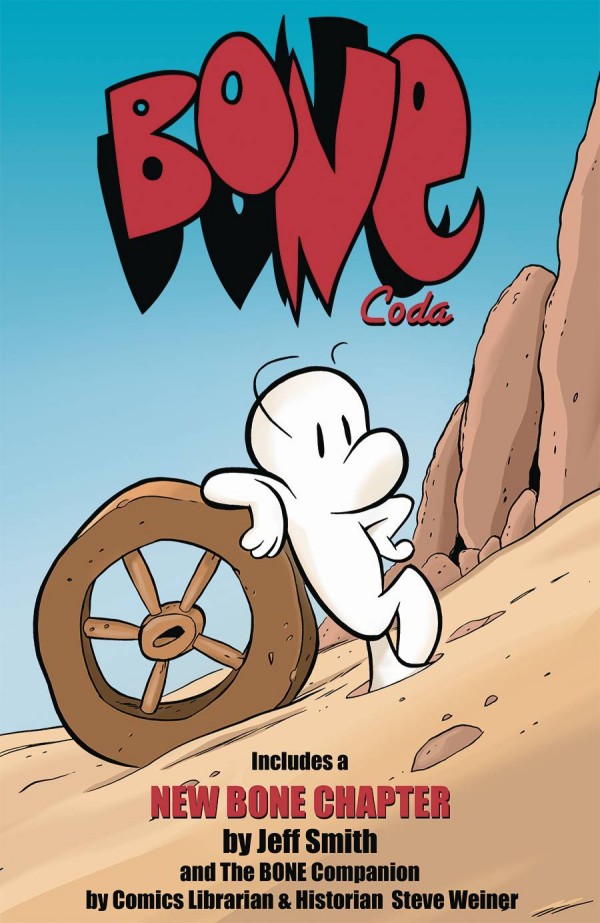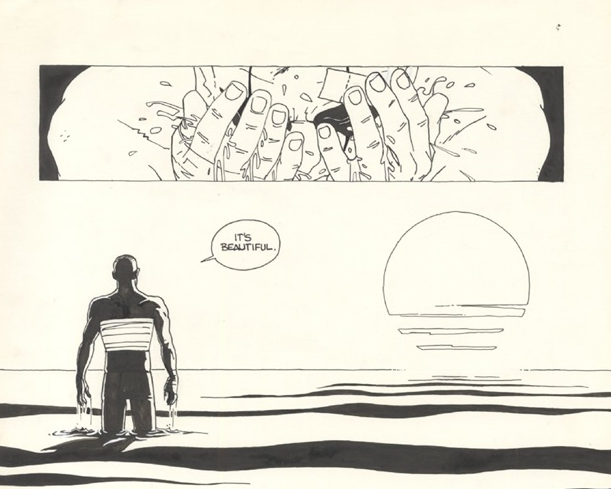 Written by Osamu Tezuka
Written by Osamu TezukaIllustrated by Osamu Tezuka
Vertical
The story of Dororo the thief and his traveling companion Hyakkimaru comes to a conclusion in this final volume of the series, where both characters must face their past and either make peace with it--or die in the process. As Dororo matures and Hyakkimaru moves ever-closer to being a real human, can they stay together? Or is it their fate to move apart? Watch them battle demons both real and personal in the final pages of Dororo.
If you're used to reading things in trade form, you may end up shocked at the extremely abrupt ending of Dororo. While I've seen good (and bad) Western comic series come and go, since I tend to read all my manga in trade form, I sometimes forget that they, too, have their origins in "floppy" magazines. That means that good ideas get canned before they're finished in Japan just as easily in America. If you only ever read in translation and book form, it's easy to overlook that possibility. After all, how many American manga companies are going to translate a "failed" series from Japan?
Just like how Marvel and DC will reprint odd offerings from hot creators (Marvel Boy from Grant Morrison or Geoff Johns' Avengers anyone?), Vertical brings us this aborted manga from a comics legend--Osamu Tezuka. Even if you don't do a Google to confirm it (I did, just to be sure), it's easy for any long-time comics reader to see that Dororo's final pages are the work of a man who didn't get to finish his story.
That's a shame, because it looks like we were going to get some really interesting character development for the title character and a better idea of why it's named after Dororo and not Hyakkimaru, who gets most of the page time in these three trades. Things are progressing normally and slowly for almost the entire book, with Dororo starting to show signs of being more than comic relief (though there's plenty of that here as well). It's not until you get to the very last chapter that the reader is given signs we're wrapping up, culminating in rushed revelations, rejections, and a final page spread that gives a vague idea of where Tezuka was headed.
At least he had a chance to do that. I've seen comics given far worse endings because of an abrupt change in plans from the publisher. However, it's still very unsatisfying, because with Dororo, Tezuka was really onto something. Unfortunately, it was probably too hip for the audience of his day.
Knowing that this series has such a quick hook, is it still worth reading? Very much so. Over the course of the volumes, Tezuka slowly develops the personalities of Dororo and Hyakkimaru. By this third collection, it's clear that they need each other. Dororo is still not ready to make it alone, but will not retire to a quieter life that Hyakkimaru recommends. Similarly, Hyakkimaru must have someone around to help him learn how to be a true human being, not a cyborg. We see this clearly despite the way in which the manga takes a sharp turn towards the end, and I wonder if Tezuka had plans to play on this idea, as he did so many times both in this volume and in the previous two.
There's also the matter of the foes that Hyakkimaru faces. We have everything from a sake-breathing shark demon (my personal favorite!) to an old priest corrupted to the unfortunately anticlimactic battle between Hyakkimaru and his father. That last battle was almost certainly rushed to meet the page count, as it should have gone on much longer. Dororo gets some good scenes in as well, battling with Buddha statues, taking on a shark, and trying to fight a variety of evil men who are much bigger and stronger. They set the stage for the many, many shonen stories we've read in the decades since, balancing action with characterization in a way that manga series seem to miss out on far too often.
Finally, I love the way in which Tezuka designs the characters in this manga. Though the creatures are a bit more normal this time, taking mostly demonic animal shapes, his drawings still have that feel of an old Looney Tunes cartoon directed by Tex Avery. People are wildly fat or tall or short or have big noses or eyes or feet. Sometimes, they even share all of these qualities. No matter how dark the material gets--and Hyakkimaru's meeting with his father and thoughts about what it means to be human can get pretty heavy--it's hard to take seriously any book where the main characters all look like they're Japanese cousins of the old-school Elmer Fudd. Between that and Dororo's colorful language, it's clear Tezuka didn't want you to spend to much time worrying about the message about humanity he sneaks in here and there.
Speaking of messages, I'm a big fan of comics writers who can slip in social commentary without it dragging down the book or feeling ham-fisted. Tezuka appears to be an expert at this. Hyakkimaru gets in several scenes here where he muses on the idea of his lost humanity at the hands of cruel parents. Dororo must face the facts that his life is not going to be nearly as easy as planned. Several non-demonic villains are shown being cruel to the world, and Hyakkimaru gives one character a simple eulogy expressing his wish for a world without cruelty. Oh, if only, Mr. Tezuka. There are definitely powerful moments in here, but as I said above, they aren't designed to be the focal point, and that makes them all the better.
I loved reading Dororo and am very sad that it's over. I definitely want to re-read it again in the future. It's earned a place in my permanent library, which is no small feat given how many comics I read in a year. Once you've read Dororo, I think you'll want to make it a keeper, too.
Dororo Volume 1 Dororo Volume 2







